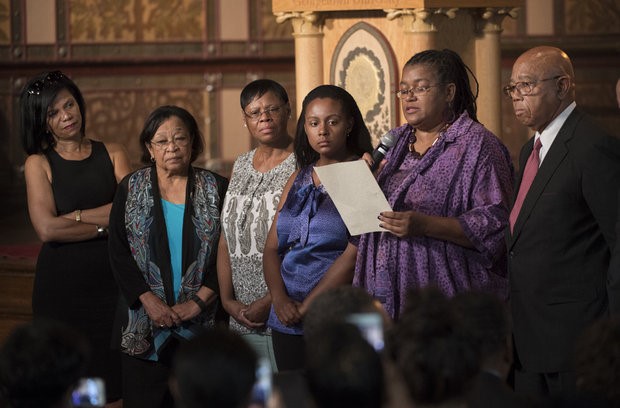
Slave descendants Sandra Green Thomas, left, Patricia Bayonne-Johnson, Zeita and Melissa Kemp, Karran Harper Royal and Joseph Steward speak during last week’s meeting at Georgetown University. (Linda Davidson, The Washington Post)
Earlier this month, Georgetown University’s leadership sent a message and delivered remarks announcing the university’s attempts at atoning its legacy of slavery. University President John J. DeGioia announced that the university would be offering preferential admission to the descendants of the enslaved Africans that were owned and sold to build and finance the university. In addition, the university committed to renaming buildings that are currently named after presidents who facilitated the sale of slaves, creating an institution for the continued study of slavery, and building a memorial to honor the 272 enslaved Africans. These strides towards reconciliation were outcomes of university’s newly formed “Working Group on Slavery, Memory, and Reconciliation.” The purpose of the committee, established last year, was to make recommendations on how best to acknowledge and recognize the history; examine and interpret the history of certain sites on campus; and convene events and opportunities for dialogue
As an alumna of Georgetown, I was initially impressed with the university’s attempts to acknowledge and reconcile its horrid legacy and role in perpetuating one of our nation’s biggest atrocities. While Georgetown is one of many universities with such a legacy, it is one of few that have actually taken concrete steps to begin addressing it. However, I think one of the university’s biggest areas of opportunity in realizing true reconciliation will be in its ability to practice true inclusion in its steps towards atonement.
One of the most glaring critiques of the university’s actions was around the exclusion of the very individuals whom are most impacted—the enslaved Africans’ descendants. Some of the direct descendants have shared their discomfort with not being part of the working group or being invited to President DeGioia’s address. I empathize with their sentiments. It only seems right that the most impacted group be represented in steps towards reconciliation and atonement. By definition, reconciliation means the restoration of friendly relations, reuniting, bringing together (again). While the formation of the working group, compiled of clergy, alumnus, and faculty of the Georgetown community, is a noble step in the right direction, it seems obvious that the conversation would be incomplete without the voices of the descendants.
Karran Harper Royal, one of the direct descendants, made a compelling point in an article that highlighted the reactions of the descendants to the university’s recent announcements. In it, she said:
“…when dealing with something as sensitive as race and the legacy of slavery, you have to humble yourself and recognize you may not recognize the path forward.”
She met Georgetown’s president when university leaders reached out to descendants earlier this year. “He welcomed us into the Georgetown family.”
“In New Orleans,” she said pointedly, “when family has a gathering – family is invited. Sometimes family is a part of putting that gathering together.”
Royal makes a valid point. When “family” has gatherings, family is invited and involved in the planning. Family is included. Perhaps that is one of the flaws in much of how we approach problem-solving and “righting-wrongs,” not just in the university setting, but also in organizations and in government, today. The folks sitting around the table, making the decisions rarely reflect the individuals whom are most impacted. In most cases, there ends up being a disconnect between the intent of solutions and their actual impact.
As Georgetown embarks on this journey, it is my hope they are intentional in ensuring their steps towards reconciliation are truly inclusive.


















